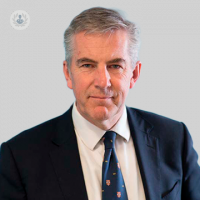Heart check – what does it involve and should I be having one?
Escrito por:A heart check-up is exactly that – a series of tests and examinations to assess your risk for heart disease. Following a heart screening, you will either be given advice to improve your cardiac health, or referred for any further tests or treatments, if necessary. Whilst not everyone needs to have a heart check, there are certain groups of people who have a higher risk of developing heart problems. Dr Nicholas Robinson, a cardiologist, explains who these risk groups are and what a heart check involves.

What do a heart check screening and risk assessment involve?
A heart screen, or risk assessment, involves several layers. The first, of course, would be to examine the patient. The things that we are looking for are:
- Checking blood pressure (i.e. do they have hypertension?)
- Listening to the heart (to check for any valve problems)
When we're talking about screening for coronary artery disease, a physical examination is actually not very helpful. To screen for coronary artery disease, we need to:
- Assess cholesterol levels (i.e. the bad cholesterol, known as LDLs)
- Assess blood sugar levels
Further to these assessments, the mainstay of screening for patients who may have primary artery disease or coronary artery disease is the CT coronary angiogram. This has really revolutionised our ability to detect coronary artery disease in people who are asymptomatic and who may be at high risk. The CT coronary angiogram is essentially an X-ray test. We inject a small amount of contrast through the vein. The procedure takes ten minutes to do. It is a very straightforward test which provides beautiful and accurate images of the coronary arteries and will tell us whether someone is at risk for a cardiac event.

Who should have a heart check screening and risk assessment?
It is quite controversial who should have a heart-check screen, but the groups that come to my mind are those with a strong family history. This indicates a genetic tendency of coronary artery disease, and those who have first-degree relatives with such conditions or experiences of heart attack should consider cardiac screening. Other groups at risk for cardiac disease include smokers or those with high cholesterol levels, so these groups of people could consider screening too.
A large group of people that I see are middle-aged people who decide to undertake endurance events, such as running a marathon. In these circumstances, sadly each year we have patients who run a marathon and have cardiac arrest or a heart attack. It is therefore important in middle-aged people who are going to really push themselves through endurance events to consider cardiac screening.
If you are concerned about your coronary health, make an appointment to have cardiac screening with an expert.


